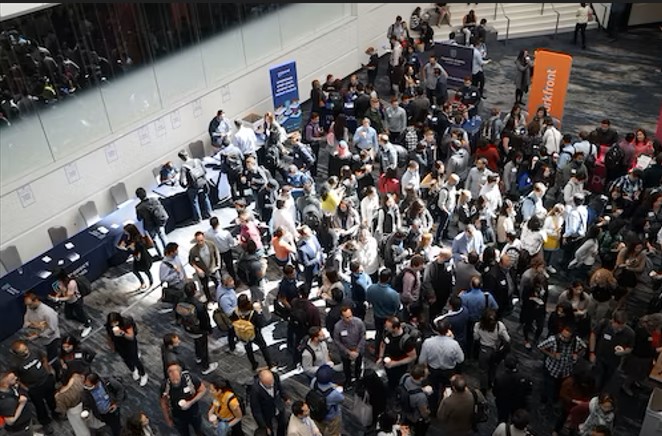Throughout the pandemic, digital communication was more often than not, the exclusive option for connecting and networking, leading to a virtual wall coming between people and face to face interaction
Today, thankfully, that wall has come down. Whilst we are still reaping the rewards of online communication and engagement, we are back together in person, and most enjoyably back together for events. According to the American Express Meetings & Events Global Forecast, a full 81% of business events in 2022 were expected to have an in-person element.
This is not to say that event managers can dust off their old agendas and pick things up where they left off. Like so many things in the post-pandemic world, the challenges and requirements of event management have fundamentally changed.
Whilst the last few years has brought fresh challenges and opportunities for the events industry. We have seen an increased awareness around sustainability, well-being, as well as a focus on creating valuable in-person experiences after two years of interference.
At Social we have had had our ear to the ground, our fingers on the pulse and have been taking part in many discussions with clients and contacts across the industry to understand where we’ve been, where we are now and what next.
In this blog, we have taken a look at all the exciting trends that we expect to see lead the sector into 2023 and beyond. From the right location to event technology, here are our top five predictions for corporate industry events in 2023 and beyond!
-
Hybrid events are here to stay!
According to Meeting & Group Business magazine, the in-person events market is set for its “strongest year ever” in 2023.
Many of us are now getting back into the swing of in-person activities, but we shouldn’t forget the value of having virtual components that enable organisations to get their session in front of a lot more people.
Planning for and managing those virtual components, in addition to physical components, adds a new level of complexity in ensuring the right technology is in place, and you must be able to locate a venue that gives both in-person and online audiences the optimal experience, on top of countless other considerations — including cost.
Our prediction is that that hybrid events will still continue in some form, especially as events this option can increase reach and allow international attendees to avoid the hefty travel costs we’re seeing in the current economic climate.
For me personally, the ability to network in person adds a deeper level of understanding and communication; something you cannot always gain from a solo virtual event. This is vital when forming new connections and can generate more beneficial and lengthy relationships.
Over the last few years, nearly every business that has held an event quickly learned how to leverage virtual events during the pandemic.
Pandemic or no pandemic, running an event as a hybrid event – or offering a virtual “digital twin” of an in-person event – instantly makes it more accessible.

-
Location, location, location!
Now, more than ever there is a huge focus on creating the best possible experience for event attendees, which in turn offers the client tangible ROI and lead generating opportunities.
Immersive, experiential events, pop-ups, holding events in the Metaverse and the increase of social media have all developed as unique methods of attendee engagement.
In recent months, we have seen a huge rise in requests for new or different event venues such as Left Bank Leeds, New Century Hall in Manchester or the hotly anticipated Factory International, Manchester’s new landmark cultural space which will welcome its first visitors in June 2023.
The fact that these unique venues are rising in popularity shows that clients are thinking outside the box and wanting to make a bigger impact on their journey. In 2023, we predict finding new inventive ways to engage audiences will be a top priority to ensure a successful outcome.

-
Revolutionising event technology
Virtual event technology has, and needed to, come a long way and is likely to continue advancing in 2023. AI, VR and AR advancements mean that event managers can create an out-of-this-world experience. Something personal, offering an experience that has never been done before.
Whilst we believe in-person events will be the central focus next year, we also recognise that as travel costs are not getting any cheaper and the cost of living crisis tightens budgets for many businesses, virtual and hybrid events will continue to be a huge part of delivering content to audiences globally.
Due to this, virtual and hybrid event technology will need to be adapted and adopted to cater to changing demands. We’ve had a few years in the virtual event world now, so the technology needs to be top notch to really be of value to organisers!
-
Sustainability
This year has seen the climate change and sustainability agendas skyrocket for the events industry, with many event professionals all reviewing their processes and trying to become more environmentally friendly. No longer just a ‘nice to have’, the industry is making huge jumps towards making events sustainable and this will continue to be a key driver into 2023.
Whether it’s minimising the number of materials that you buy new, or choosing suppliers from within a smaller radius, coming at your event with sustainability in mind means you’ll have a clearer overview of what needs to be done throughout the process.
It’s important to consider your suppliers when thinking of your overall carbon impact. Suppliers have a large impact on your event’s overall carbon footprint, so finding venues and suppliers who align with your goals is an important step in reducing your impact.
-
Look after the mind and the purse
After a turbulent few years, there has been a huge shift this year on improving overall wellbeing.
In terms of events, we believe that packed-out agendas, and rushing to that next meeting or networking event will be a thing of the past. Instead, there will be more breaks scheduled, as well as a renewed focus on the overall agenda, ensuring that meetings are not death-by-powerpoint but that there is a big focus on team building activities, and bringing teams together to inspire, motivate and energise attendees.
When it comes to planning events, we at Social understand the need for stakeholders, and businesses to ensure that they are aligned to their company objectives. It will become more important than ever to prove genuine ROI from events. The events that organisations do put on are going to have to be more strategic with clarity and focus on what part the event itself plays in the bigger picture and what measurable returns are on it. We should only be putting on events that take campaign programmes to the next level. There may be slightly fewer events, but they may be significantly more impactful.
Events drive people from their homes and offices to take part in something that enhances their knowledge, connections, and ways of doing business.
While the events sector may have faced its fair share of disruptive scenarios in the past 3 years – I think it’s fair to say 2023 is the year to get back at it!
If you’d like to find out more about how Social provides event project management support please contact senior account manager Katie Paterson at katie.paterson@social.co.uk


